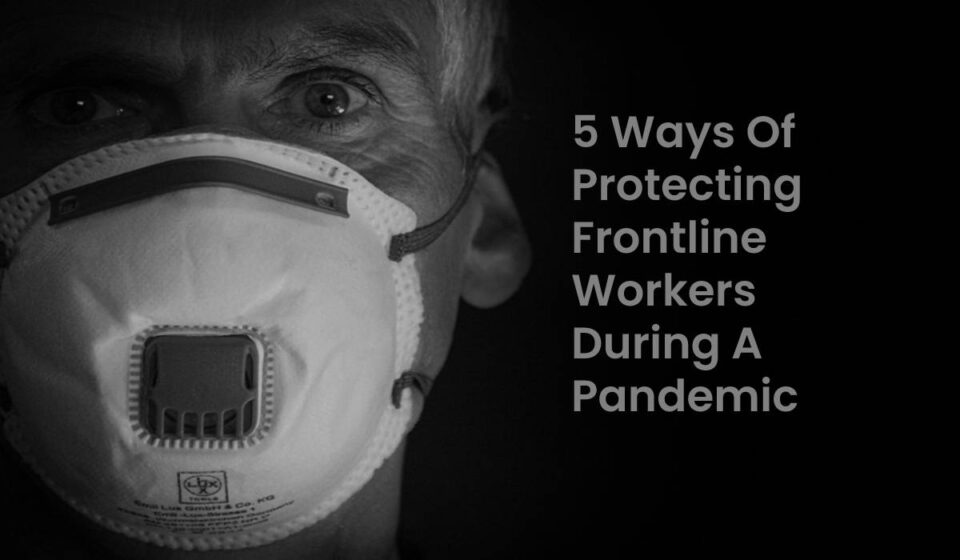The ongoing pandemic puts frontline workers at risk of contracting the virus while treating those already infected. By putting their lives on the line, our healthcare workers could be the difference between life and death in some cases. It is crucial to keep them safe so they can keep those infected safer. So, protecting frontline workers became necessary nowadays.
Table of Contents.
Sadly, many healthcare facilities ignore this crucial aspect to save cost, putting frontline healthcare workers at risk of contracting viruses and infections. Other than negligence, here’s a breakdown of what elevates the risk of spreading viruses and diseases.
- Lack of experience in dealing with the virus
- Working for long hours without rest
- Exposure to a lot of infected people
- Shortage of Personnel Protective Equipment
- The inefficiency of hospital management.
Through extensive research, we’ve found practical ways of protecting frontline workers during a pandemic.
Also read: Corona Symptoms And Its Manifestations By Experts
Training Comes First To Protecting Frontline Workers
Whether it is Covid-19 or any other virus, it needs proper research to understand how it spreads and affects humans. This research, imparted to health care workers and ordinary people, is crucial in overcoming a pandemic. At the beginning of the pandemic, many countries provided enough training to their front liners and granted them safety equipment to keep them safe from the ones infected.
This is especially true for nurses, who look after patients when doctors aren’t around. It would help if nurses earned a terminal degree in nursing to understand the virus better and take preventive measures when doctors are unreachable. These frontline workers must be trained on sanitization, using Personal Protecting Equipment (PPE), handling blood samples for tests, and transferring the patients to isolation wards.
Nowadays, dedicated online platforms offer free courses on pandemic studies to educate both health care workers and ordinary people. They can also attend seminars and webinars conducted by WHO and their local medical professionals.
Also Read: Benefits Of Vitamin D Its Sources, Deficiency, And Dosage
Making PPE And Test Kits Easily Accessible for Protecting Frontline Workers
On the 3rd of March 2020, WHO instructed manufacturers of healthcare products to boost the production of Personal Protection Equipment by 40% to combat the PPE shortage worldwide. All health care professionals must follow mandatory safety protocols depending on their exposure to the virus. For instance, those involved in the direct treatment of infected individuals and their PCR tests must wear a PPE set.
Laboratory and hospital staff who carry specimens from one place to another must wear surgical masks and gloves. The sterile services department staff must be vigilant to ensure enough PPEs, head covers, gloves, plastic shields, surgical masks, and waterproof gowns are provided to the healthcare staff.
Arming our healthcare workers with safety gear and making testing kits readily available to speed up testing is imperative if we want to control the spread of the virus. Even though the situation is getting more serious, many countries have neglected crucial aspects of safety, and as a result, our saviors became sufferers.
Taking Care of Their Mental Health
Exhausted and stressed by long-hour shifts and witnessing uncountable deaths daily leaves healthcare workers traumatized, leading to a loss in productivity.
In these times, the hospital management should take the steps necessary to ensure our healthcare workers are taken care of before facing a situation worse than the current one.
Following are a few steps to help reduce the mental constraint in healthcare:
- We are offering rotational shifts instead of continuous long hours in one go.
- I am arranging sessions with therapists for moral support and counseling (if needed).
- They were acknowledging their efforts to lift them emotionally and encouraging them to perform better.
- Being empathetic to help them in whatever manner you can.
Protecting Frontline Workers on Training the Volunteers
As the number of patients is increasing day by day, healthcare workers aren’t enough to deal with the growing number of infections. Healthcare workers need an extra hand now and then, and this is where volunteers come in.
It is the responsibility of the hospital management to ensure the safety of the volunteers in the same way they are for their staff. Volunteers should pay something as a reward for risking their lives, giving their time, and putting in effort for a noble cause.
Most volunteers have little to no experience in the medical field; hence, the management should provide safety equipment like gloves, masks, and sanitizers to ensure they’re not at risk.
Also Read:
Observe Patients from a Distance
Limiting the presence of front liners near patients is a proven way of ensuring the virus doesn’t spread. As the infect people are put in isolation wards, the number of visits to the wards must be limited.
Since not all hospitals have enough resources to buy cameras for every room. So, here patient’s privacy screens come in a picture to help you out in dividing the patients from each other and saving the patients and hospital staff from catching the dangerous infection which keeps health workers and staff safe.
Accepting All Health Care Systems Have Loop Holes
Nothing is perfect in this world. There are imperfections in every system. So, the important thing is identifying those imperfections and working on them to become better than yesterday.
When we talk about health care facilities, there are several loopholes to look out for; during the underlying days of the Covid-19 breakout. The legislatures of big nations like USA, were speechless because they are not ready for a notably pandemic.
This is one of the many reasons why the USA is one of the most infected countries in the world. Instead of imagining health care systems to be flawless. Hence, it is better to evaluate the overall performance from the beginning of the pandemic till now. And also, work on the areas that are weak and vulnerable.


